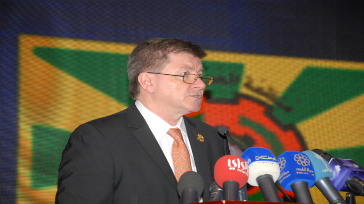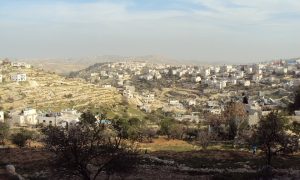ILO Director-General: Creating jobs key to stability in the Arab region
In his address to the Arab Labour Organization’s 42nd Conference, International Labour Organization Director-General Guy Ryder urged the region’s leaders to tackle unemployment, respond to globalization challenges, strengthen the private sector and engage in effective social dialogue.
BEIRUT (ILO News) – The Arab region must respond to an “acute crisis of unemployment” because failure to provide decent work opportunities is a “potent threat to the stability of our societies,” said International Labour Organization (ILO) Director-General Guy Ryder at the opening of the 42nd session of the Arab Labour Conference (ALC) in Kuwait on Sunday (19 April.)
“Yes this is a global crisis, but it is most sharply felt in your countries, and especially by your young people,” Ryder added in his address before government, worker and employer representatives from 21 Arab countries gathered for the annual event.
Unemployment in the Arab states is the highest worldwide, with regional unemployment rates exceeding 11 per cent in the Middle East and 12 per cent in North Africa.
The problem is particularly pronounced for youth and women. One in four young men and women are estimated to be out of work in the region, which registered a women’s labour force participation rate of a mere 19 per cent.
The extremely high rate of youth unemployment was one of the main driving forces behind the popular uprisings which swept the region in recent years.
This year’s ALC, held by the Arab Labour Organization (ALO) from 18-25 April, marks the 50th anniversary of the ALO. It focuses on social dialogue under the heading “Embodiment of Solidarity for Development and Employment.”
Globalization and the private sector
Ryder also stressed the need for the region to heed the challenges of globalization, which “is generating change of unprecedented speed and scale. Together with technological innovation, it is making knowledge the key to economic success. Those who cannot innovate to shape and adapt to change, those who fail to build the skills for the future, will fall behind.”
To do this, the region must strengthen its private sector, Ryder said. Over the past two decades, job creation in the Middle East and North Africa has remained concentrated in low productivity sectors and the expanding informal economy. Pro-market reforms have largely failed to promote job-rich private sector growth at a time when jobseekers can no longer count on public sector employment.
“The state and the public sector can no longer be expected alone to shoulder the entire responsibility to meet these challenges. Increasingly, jobs are and will be created in the private sector with the state facilitating and promoting rather than providing employment,” Ryder told delegates in Kuwait.
Social dialogue to benefit all
The ILO Director-General said truly effective social dialogue between governments, workers and employers is a crucial mechanism through which to generate and manage this needed change.
“Such dialogue allows for balanced, practical and fair solutions, and participation in it gives a feeling of ownership and acceptance and so stability too (…) It is important to understand that real social dialogue can only be based upon the existence of independent and representative organizations of workers and of employers and their freedom to exercise their rights in full,” he said.
The ILO stresses that improving social dialogue mechanisms in the Arab region is a requirement and significant tool for addressing labour challenges, realizing fundamental principles and rights at work by all, creating decent jobs and extending social protection.
“The objective is to produce results which benefit society as a whole, not just sectional interests, and so we need to be attentive to the voices of women and of migrant workers in line with the ILO’s agenda for fair migration,” Ryder added.
In the Arab states, the ILO promotes social dialogue by helping to modernize national labour legislation, raise capacities of labour administration, strengthen worker and employer organizations, and promote gender equality, amongst other means.
The ILO maintains a large number of technical cooperation projects in the occupied Palestinian territory (oPt,) and is implementing a development-based response to the regional effects of the Syrian refugee crisis. Ryder invited Arab states to support the ILO’s vital work in both areas.
Ryder ended his address by thanking the outgoing ALO Director-General Ahmed Luqman for his leadership over the past eight years. Delegates are expected to elect a new director-general for a four-year period during the conference.
On the sidelines of the conference, the ILO Director-General met with Kuwait’s Minister of Social Affairs and Labour and Minister of State for Planning and Development Affairs Hind al-Subaih and other Arab labour ministers and delegates participating in the conference.
Ryder previously participated in the 40th Session of the Arab Labour Conference held in Algiers in 2013.
The annual event brings together delegates from 21 Arab countries to discuss labour issues and policy responses.
The ILO and ALO have a long history of cooperation in the Arab region, dating back some four decades, and the two agencies signed a Memorandum of Understanding in 2007.
For media queries, contact:
Salwa Kanaana, Regional Communication and Public Information Officer, ILO Regional Office for Arab States, Tel: +961 1 752 400 (Ext 117), Mobile: +961 71 505958, email: kanaana@ilo.org


























